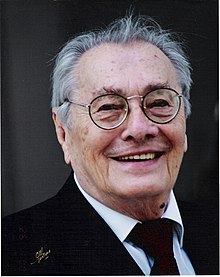Luis Miquilena
| Luis Miquilena | |
|---|---|
 |
|
| President of the Constituent Assembly | |
|
In office 1999–2000 |
|
| President | Hugo Chávez |
| Preceded by | position established |
| Succeeded by | Delcy Rodríguez (2017) |
| Minister of Interior and Justice | |
|
In office February 2001 – January 2002 |
|
| President | Hugo Chávez |
| Preceded by | Luis Alfonso Dávila |
| Succeeded by | Ramón Rodríguez Chacín |
| Personal details | |
| Born |
Luis Manuel Miquilena Hernández July 29, 1919 Santa Ana de Coro, Venezuela |
| Died | November 24, 2016 (aged 97) Caracas, Venezuela |
| Nationality | Venezuelan |
| Political party | PCV, PRP, URD, MVR |
| Children | Tanya Miquilena de Corrales (Died March 19, 2016) |
| Profession | industrialist, politician |
Luis Manuel Miquilena Hernández (July 29, 1919 – November 24, 2016) was a Venezuelan politician. He was involved in politics in the 1940s, and again after the 1958 restoration of democracy, but retired from politics in 1964 until the early 1990s, pursuing a career in business. He was then an early supporter of Hugo Chávez' post-1992 political career, and was the Venezuelan Minister of Interior and Justice from 2001 to 2002, when he resigned.
Miquilena began his political career with the Venezuelan Communist Party (PCV) in the 1940s as Secretary General of the Union of Bus Drivers (Spanish: Sindicato de Autobuseros), allied with President Isaías Medina Angarita. He remained with the PCV for the next four years. Later, he became a firm opponent of president Rómulo Betancourt (first presidency 1945-1948). In 1945, he broke with the PCV over their support of Betancourt and formed his own political party, the Revolutionary Party of the Proletariat (PRP). The PRP was short-lived, lasting from the overthrow of the Gallegos government (in office February 1948-November 1948) until the rise of Marcos Pérez Jiménez.
Miquilena opposed Pérez's government as well and as a result was jailed for much of the dictatorship and was initially tortured at a jail in Caracas. He was later transferred to a jail in Ciudad Bolivar, Miquilena became friends with Democratic Action politician Simón Alberto Consalvi, stating that "Simon was a man that I think men should be". While imprisoned, family members would communicate cryptically by marking points on letters of books delivered to prisoners, informing Miquilena of the condition of Venezuela outside of prison. His time in prison helped him decide his views on politics. Jiménez was overthrown in 1958, and in an attempt to stabilize the fledgling democracy that succeeded the dictatorship, three Venezuelan political parties entered into the Pacto de Punto Fijo.
...
Wikipedia
